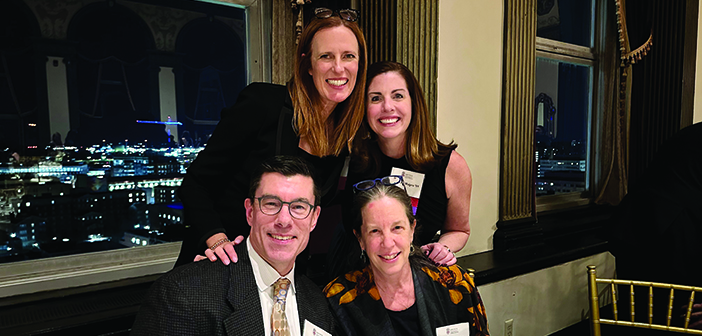The first Ivy League family medicine residency celebrates a half-century of training physicians.
Caroline Richardson, MD, chair of family medicine, can describe the national impact of her department in one word: “astonishing.”
More than 620 residents have graduated since the program’s inception in 1975. Five decades of research and teaching have produced thousands of published academic papers, prepared thousands of students to provide essential patient-centered care, and trained nearly half of the family medicine physicians in the state.
“Brown has always had a strong focus on teaching excellence, and that includes how we teach our physicians,” says Richardson, who is also the George A. and Marilyn M. Bray Professor of Family Medicine.
Richardson joined alumni and faculty to mark the residency program’s 50th anniversary with a gala (including a cocktail hour sponsored by the Elise Coletta Leadership Endowment for Family Medicine Teaching) and a reunion breakfast in March. The department celebrated its continued success in physician training, patient care, and advocacy, alongside its indelible place in Rhode Island health care.
Professor of Family Medicine Jeffrey Borkan, MD, PhD, who chaired the department until 2022, oversaw significant expansion during his 21-year tenure, which included a second residency training site, new fellowship programs, and new partnerships with local hospitals.
“There was a need for more advanced primary care,” Borkan says about physician training in the ’70s. “We were the first Ivy League medical school to put its toe in the water by establishing this department.”
For its first 40 years the family medicine department, established in 1978, focused primarily on Pawtucket and Central Falls, with most clinical services at Memorial Hospital of Rhode Island. Following Memorial’s closure in 2018, adult inpatient services and training shifted to The Miriam and Kent hospitals, with maternal and child health care at Women & Infants and Kent.
“We went from being this locally known entity to providing most of the family medicine care throughout the state,” Borkan says of the department’s evolution.
Clinical Professor Emerita of Family Medicine Julianne Y. Ip ’75 MD’78 RES’81, P’18, says when she first arrived at Brown, the Medical Education Program had just launched and she quickly settled in. “Even now, when I speak with cohorts and others abroad, they talk about how the faculty is engaged and excited to teach you, and I could feel that back eons ago,” she says.
Ip says that even as medical students, she and her peers were encouraged to teach and mentor others. This motivated her to eventually join Brown’s faculty, going on to become the first associate dean of the Program in Liberal Medical Education, a position she held until her retirement in 2021.
“The underlying philosophy of family medicine hasn’t changed,” Ip says. “Taking a holistic view of patients and meeting them as a person and understanding their lived experiences is still at the core.”
As the department integrates emerging technologies while confronting a nationwide shortage of primary care physicians, Richardson emphasizes balancing modernity with patient relationships amid a complex “information overload.”
“Physicians have to quickly get up to speed with whatever they need to be an expert in, with diverse patients and conditions,” she says. “To address that, whether from learning from scientific literature or medical records, is a big challenge.”
Borkan adds that growing the number of primary care physicians will be essential not only to Rhode Island, but for the nation. Out of roughly 750 graduate medical education slots at Brown-affiliated hospitals, he says fewer than 100 are within primary care—a number that will need to be doubled or even tripled to meet the demands of the health care system.
“We need our colleagues across different specialties, but I think it’s important that we continue to have champions for primary care, like the leadership of Care New England and the dean of the medical school [have been],” he says.




